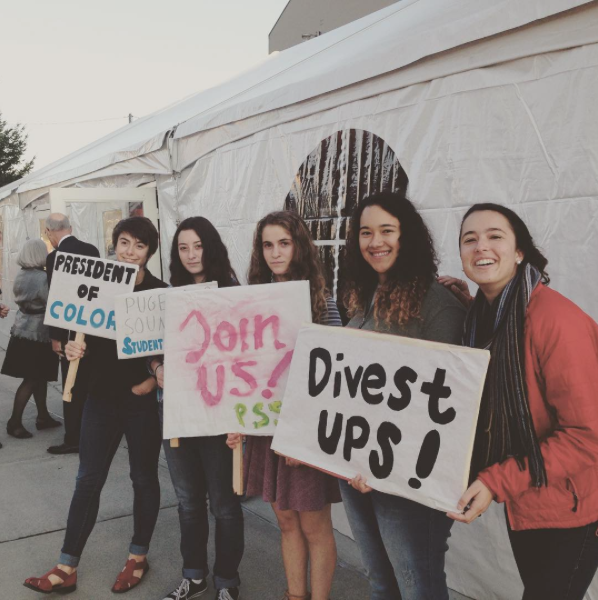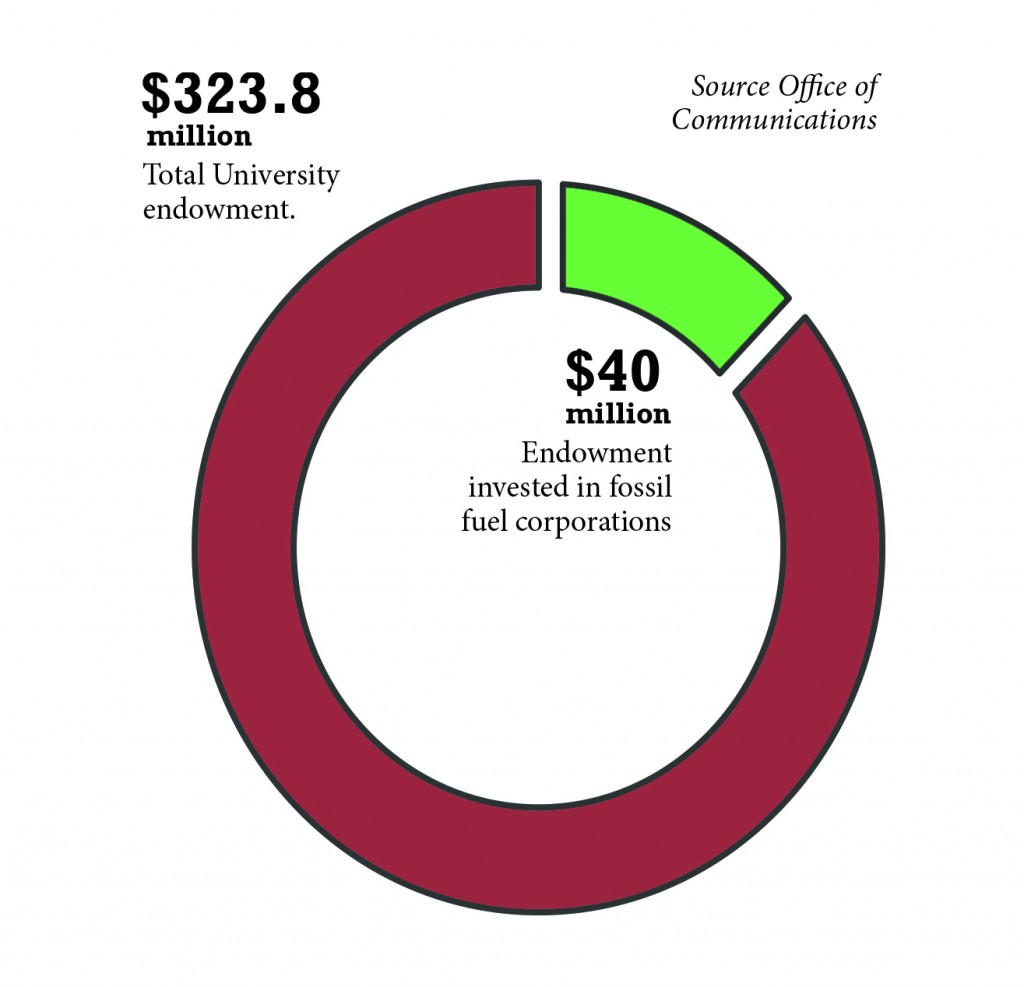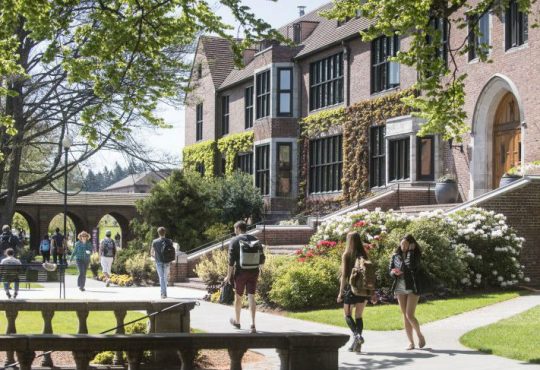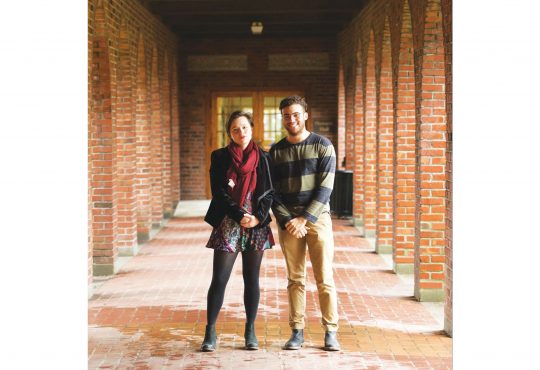
The U.S. Forest Service spent a record-breaking $200 million per week combating wildfires this past summer according to the Department of Agriculture. Washington was one of the worst-affected states, can expect even hotter summers in the future.
The National Research Council in 2011 stated that the Western United States can expect a 200–400% increase in area affected by wildfires in the Western United States.
Mitigating global warming has been on the minds of many students at Puget Sound lately, with the Puget Soud Student Union (PSSU) picketing the Board of Trustees meetings on October 1, 2 and 3 and holding up signs reading “Divest UPS.”
Fossil Free, a project of 350.org—a prominent global grassroots divestment movement—defines divestment as “getting rid of stocks, bonds, or investment funds that are unethical or morally ambiguous” with the intention to encourage corporations to limit polluting emissions.
A petition calling for the University to divest was circulated by the student-run ECO Club on Sept. 6 with the goal of reaching 750 signatures. This petition calls for the University to abstain from all new investments related to fossil fuels, and to fully divest its endowment within five years. On Oct. 7, just over a month later, they reached their signature goal.
The success of this petition does not mean that the University will choose to divest; several barriers remain to the implementation of a divestment project for the University’s endowment.
“The increased size and complexity of our endowment in recent years led to our decision to contract with an Outsourced Chief Investment Officer to manage our endowment,” Vice President for Finance and Administration Sherry Mondou said.
According to the Office of Communications, Puget Sound’s endowment was valued at $323.8 million as of July 31, and approximately $40 million of that is indirectly invested in fossil fuel corporations. The University’s endowment is invested in several types of pooled funds managed by Perella Weinberg Partners (PWP). The benefit of this system is that the endowment has access to exclusive fund options that have high rates of return, but at the expense of exerting direct control over financial arrangements.
Yet the endowment is not managed by the University’s administration, as decisions related to investment strategy and the endowment are the purview of the Board of Trustees. Representatives of ECO Club first met with the Board last year to discuss the possibility of divestment, bringing alumni with them to demonstrate the continuity of the movement.
“They were dismissive and blunt about it [divestment], they didn’t think it was feasible, and they asked us not to submit a petition,” President of ECO Club Curtiz Mraz said.
Leaders of the campus divestment movement acknowledge that the efficacy of divestment as a strategy by a small institution like Puget Sound is relatively limited.
“Realistically, pulling $39 million out of big oil and coal won’t hurt them [large fossil fuel corporations], which is hard for people to grasp,” Mraz said.
However, when Mraz and other ECO club members met with the Board again in February, they received a more favorable reaction. According to Mraz, they asked ECO to hold off on action for the Board to draft a statement on the possibility for action on divestment. Yet there was no progress when they met again in May.
“We went ahead and created the petition,” Mraz said. “It’s been a mutually respected, civil relationship but the petition is the first push-back in taking a stand.”
ECO Club representatives and members of the administration both brought up the example of the Rockefeller Trust’s decision to divest.
“Perella Weinberg Partners is the outsource partner that the Rockefeller Trust used to divest their funds, so we don’t necessarily need to stop working with them to divest,” Mraz said.
“Rockefeller is not commingled and has an entirely separate arrangement with PWP,” Mondou said. “They say they are working towards divesting, but in reality they haven’t made much progress. Many institutions are making divestment statements that are hollow.”
Mondou went on to explain this point, saying that several institutions used as examples by the divestment movement, such as the Rockefeller Trust and Pitzer College, have either not gone through with the process of divesting or have done it in a disingenuous fashion.
“I think the Board gets that climate change is an important issue, but they are thinking about the best ways for Puget Sound to create meaningful change without making hollow promises,” Mondou said.
Puget Sound has demonstrated its commitment to sustainability and the environment, evinced by such actions as the creation of the Sustainability Advisory Committee and the signing of the Climate Commitment by President Thomas, among others.
However, neither the environment nor sustainability are mentioned in the University’s mission statement. This is a critical point, as Washington State law requires board members to adhere to an institution’s mission statement in carrying out their duties. Furthermore, with the exception of implementing an institution’s mission, board members are mandated to emphasize investment returns over any other consideration when managing an endowment.
When asked about the Board’s responsibility in relation to divestment, several members of the administration stressed the financial responsibility that trustees have in making smart investments that have significant real returns.
“It’s their role to invest funds from donors in a responsible manner,” Associate Vice President of Business Services and Executive Director of Community Engagement John Hickey said. “They need to make sure that they’re maximizing their return on investments to support the institution.”
Currently, the endowment does reap a significant return; it is expected to make $12 million annually from investments.
“Half of the profits from the endowment go to funding student grants, and the other half goes towards paying salaries, creating and expanding campus programs and funding faculty and student research,” Mondou said. “Any decrease in the return on our endowment will have a negative impact on our ability to maintain and create future grants and programs at the University.”
Members of the administration also praised the Board for their careful approach towards the decision to pursue divestment or not.
“Our trustees are very genuine people, and they take their role really seriously,” Hickey said. “This is a very complex issue and they have to consider multiple significant factors before coming to a decision.”
“There are many complexities to this issue, and the Board has to juggle different responsibilities. Their focus is to ensure funding so that the University can carry out its mission,” Moundou said.
The Board of Trustees only meets three times a year, which, in conjunction with their deliberate decision-making process, inhibits quick institutional changes.
“The Board has not been able to come up with the statement [on divestment] that they said they would,” Mraz said.
Mraz added that the Board’s inability to make a public statement on the issue demonstrates their lack of progress in making a decision on divestment, to the frustration of student activists. On the other hand, ECO Club meets almost every week, which allows them to devote more time to the issue of divestment. This demonstrates that the different groups involved in this process do not see eye to eye on the timeline of decision-making processes.
Divestment is not an issue that will go away when the leaders of the movement graduate, which has been a historical problem with personality-driven campus movements. “We aren’t going anywhere,” said Emma Casey, the ECO Club Treasurer, on the future of the movement. “I think we have significant staying power, and every year we’re bringing in first-year students who also care about this issue. So we’re here, and we’re going to be advocating for it until it happens.”
“That’s exactly what we told the Board of Trustees,” Mraz said.



